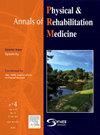未满足的长期需求和未满足的康复需求对中风幸存者生活质量的影响:一项横断面研究
IF 4.6
3区 医学
Q1 REHABILITATION
Annals of Physical and Rehabilitation Medicine
Pub Date : 2025-06-17
DOI:10.1016/j.rehab.2025.101996
引用次数: 0
摘要
背景:长期未满足的需求在中风幸存者中普遍存在。它们对生活质量(QoL)的影响在西方人口中已有报道,但在西太平洋人口中仍未得到广泛研究。目的:我们旨在确定韩国中风幸存者的长期未满足需求和未满足的康复需求,并评估其与生活质量的相互关系。方法在本横断面研究中,对2015年1月1日至2019年12月31日期间4个地区心血管疾病中心收治的1002例脑卒中幸存者进行调查。未满足的需求根据卒中后长期未满足需求(lun)问卷项目进行评估。生活质量采用EuroQoL 5维3级(eq - 5d - 3l)问卷进行评估。EQ-5D指数最低的25%被定义为低生活质量。为分析影响健康相关生活质量的因素,采用EQ-5D指数进行多元logistic回归分析。结果94%的参与者至少有一项未满足的康复需求,311人(33%)报告未满足的康复需求。中风后最常被提及的未满足需求是“申请福利方面的帮助”(49%)、“日常职业方面的建议”(47%)和“害怕摔倒”(38%)。低生活质量的优势比(OR)随着未满足需求数量的增加而显著增加(OR = 1.17;95%可信区间[CI], 1.10-1.24),未满足的康复需求(OR = 1.71;95% CI, 1.10-2.64)和更高的修正秩金量表(mRS)评分(OR = 2.82;95% ci, 2.35-3.39)。结论长期未满足的需求、未满足的康复需求、低功能水平与较低的生活质量有关。需要以社区为基础的长期护理来解决这些未满足的需求,以改善脑卒中幸存者的生活质量。这些研究结果来自于韩国相对年轻且不太严重的中风幸存者人群,在不同的年龄组、中风严重程度、种族和社会经济背景中,其普遍性可能有限。跨文化验证对于确定其在不同环境中的适用性至关重要。本文章由计算机程序翻译,如有差异,请以英文原文为准。
Effects of long-term unmet needs and unmet rehabilitation need on the quality of life in stroke survivors: A cross-sectional study
Background
Long-term unmet needs are prevalent among stroke survivors. Their impact on quality of life (QoL) has been reported in the Western population but remain largely unexplored within Western Pacific populations.
Objectives
We aimed to identify the long-term unmet needs and unmet rehabilitation need among stroke survivors in South Korea and evaluate their intercorrelations with QoL.
Methods
In this cross-sectional study, a total of 1002 survivors of stroke, admitted to 4 Regional Cardiocerebrovascular Disease Centers between January 1, 2015 and December 31, 2019, were surveyed. Unmet needs were evaluated based on the Longer-term Unmet Needs after Stroke (LUNS) questionnaire items. QoL was evaluated using the EuroQoL 5-dimension, 3-level (EQ-5D-3 L) questionnaire. The lowest 25 percentile of the EQ-5D index was defined as low QoL. To analyze factors influencing health-related QoL, as measured by the EQ-5D index, a multiple logistic regression analysis was performed.
Results
Among the participants, 94 % experienced at least one unmet need and 311 (33 %) reported unmet rehabilitation need. The most frequently cited unmet needs after stroke were “Help with applying for benefits” (49 %), “Advice on daily occupation” (47 %), and “Fear of falling” (38 %). The odds ratio (OR) for low QoL significantly increased with number of unmet needs (OR = 1.17; 95 % confidence interval [CI], 1.10–1.24), unmet rehabilitation need (OR = 1.71; 95 % CI, 1.10–2.64), and higher Modified Rankin Scale (mRS) score (OR = 2.82; 95 % CI, 2.35–3.39).
Conclusions
Long-term unmet needs, unmet rehabilitation need, and low functional level were associated with a lower QoL. Community-based long-term care is needed to address these unmet needs to improve QoL in survivors of stroke. The generalizability of these findings, derived from a relatively younger and less severe stroke survivor population in Korea, may be limited across different age groups, stroke severities, ethnicities, and socioeconomic backgrounds. Cross-cultural validation is crucial to determine their applicability in diverse settings.
求助全文
通过发布文献求助,成功后即可免费获取论文全文。
去求助
来源期刊

Annals of Physical and Rehabilitation Medicine
Medicine-Rehabilitation
CiteScore
7.80
自引率
4.30%
发文量
136
审稿时长
34 days
期刊介绍:
Annals of Physical and Rehabilitation Medicine covers all areas of Rehabilitation and Physical Medicine; such as: methods of evaluation of motor, sensory, cognitive and visceral impairments; acute and chronic musculoskeletal disorders and pain; disabilities in adult and children ; processes of rehabilitation in orthopaedic, rhumatological, neurological, cardiovascular, pulmonary and urological diseases.
 求助内容:
求助内容: 应助结果提醒方式:
应助结果提醒方式:


